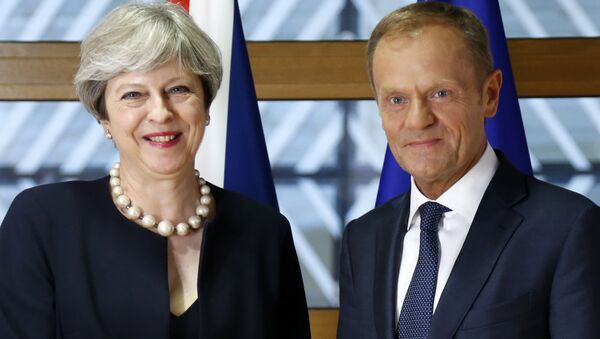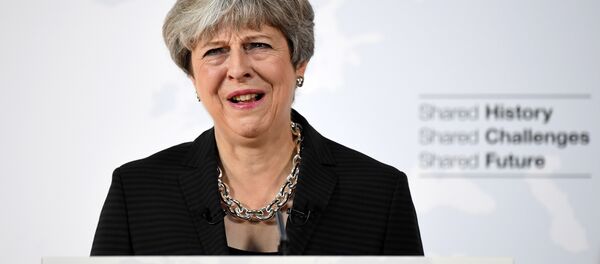UK Prime Minister Theresa May is meeting with European Council President Donald Tusk in London as she tries to break the stalemate in Brexit talks.
Tusk headed to London September 26 after having a pre-briefing with Michael Barnier, the European Union's chief Brexit negotiator.
Discussing progress of #Brexit talks with EU27 negotiator @MichelBarnier before meeting @theresa_may in London today. pic.twitter.com/ysZYi4APtL
— Donald Tusk (@eucopresident) September 26, 2017
It comes as further Brexit talks in Brussels have again been marred by little progress on major issues, with Barnier saying the UK had to settle its obligations to the EU before talks of a transitional deal and the pair's future relationship can proceed, while Brexit Secretary David Davis insists there are "no excuses" for not moving forward.
Barnier ended the third round of negotiations August 31, by noting neither side had made "any decisive progress" on the key issues inherent in the United Kingdom's withdrawal from the bloc. His closing appraisal echoed exactly his remarks at the start of the third round — he spoke of his "concern" about the lack of advancement on the three major issues surrounding the UK's exit from the bloc: EU citizens' rights, the UK's financial settlement, and the border (or lack thereof) between the Republic of Ireland and Northern Ireland.
“We want to be your strongest friend and partner as the EU and the UK thrive side by side.” – PM’s Florence speech pic.twitter.com/1pldMAaGlC
— UK Prime Minister (@Number10gov) September 22, 2017
The meeting with Tusk is being portrayed as a key opportunity for May to outline her Brexit vision to member state leaders, and get discussions back on track. However, social media users are unconvinced, flocking to platforms such as Twitter to voice their skepticism, and lack of faith in the utility of the miniature summit.
Donald Tusk is trending. That usually means the MSM trying to boost him as a VIP and Twitterland is discovering he's not doing much at all.🙄 pic.twitter.com/oJWa6KBqmC
— Arden_Forester (@Arden_Forester) September 26, 2017
Theresa May will meet with Donald Tusk today and they'll decide nothing at all. The end.
— Isa-Maria Smith (@isamariasmith) September 26, 2017
It's a little surprising to see Donald Tusk trending. It's even more surprising to see absolutely no substantial content in those tweets lol
— Kacper Filip 🍀 (@_repcak) September 26, 2017
We already know he is incapable of compromise so why bother? "Donald Tusk"
— Richard Bostel (@RichardBostel) September 26, 2017
@theresa_may To have more pretend talks on Brexit with #DonaldTusk
— SmellTheFlowers (@WelshCelt) September 26, 2017
The Council will meet next month to decide whether "sufficient progress" is being made for talks to move on to discussions of a trade deal.
May's Florence Speech
In a speech in Florence September 22, May said she wanted a two-year transition period in which Britain would stay in the single market, to provide "certainty" for business. Positive initial responses on both sides of the English Channel raised hopes the move would encourage the EU to begin talking about a trade deal, but on September 25, Barnier said talk of a transition could not precede talks on settling the divorce bill, issues related to EU citizens' rights and Ireland.
He said he was "keen and eager" to understand how the Prime Minister's speech would be turned into a negotiating strategy.
"We do not need to remind ourselves we are six months into the process. We are getting closer to the UK's withdrawal and I think this should be a moment of clarity," he said.
#GAC (Art50) Council, in #EU27, looked at the progress of #Brexit negotiations & agenda for Oct. #EUCO. Read more: https://t.co/1g53aNC6sv pic.twitter.com/VsBL70xbz6
— EU Council (@EUCouncil) 25 September 2017
'New Deep and Special Partnership'
David Davis has claimed citizens' rights will be incorporated fully into UK law, progress had been made on resolving the Irish border and insisted the UK would "honor commitments" made during its EU membership.
"It's obvious reaching a conclusion on this issue can only be done in the context of and in accordance with our new deep and special partnership with the EU. The UK is absolutely committed to working through the detail. We are laying out concrete proposals, there are no excuses for standing in the way of progress. It will take pragmatism on both sides to make headway and I hope we can achieve that this week, Davis added.
Whether a resolution has genuinely been reached on these issues or not, the absence of consensus does not stop the Brexit clock from ticking.
According to Article 50, the UK must exit the EU by March 2019, whether a deal has been reached or not.
If no settlement is reached, the UK could face a "cliff edge" Brexit — no deal on the terms of the the country's withdrawal and no deal on the UK's relationship with the bloc, with EU citizens residing in the UK and UK citizens based in the EU plunged into legal limbo.



